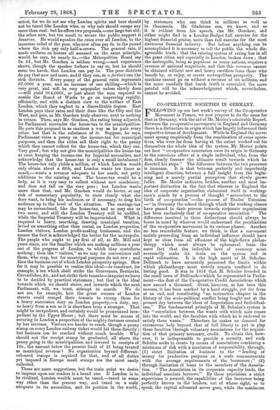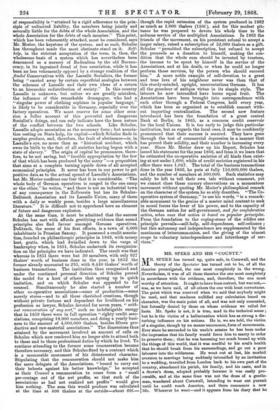CO-OPERATIVE SOCIETIES IN GERMANY.
FOLLOWING up our last week's survey of the Co-operative Movement in France, we now propose to do the same for- that in Germany, with the aid of Mr. Morier's admirable Report Between the co-operative movements in England and Germany there is a distinction in origin which has largely influenced their respective forms of development. While in England the move- ment sprang empirically from the combination of some opera- tives, who were far from having at the outset worked out for themselves the whole idea of the system, Mr. Morier points out how " co-operative association owes its origin in Germany to the conscious effort of a single individual, who, from the first, clearly foresaw the ultimate result towards which he directed his steps." The difference between the two processes is immense. It is that between perfectly and imperfectly intelligent direction, between a full insight from the begin- ning and a merely partial perception that slowly grows- fuller. Mr. Morier indicates, besides, another and most im- portant distinction in the fact that whereas in England the idea of corporate organization elaborated itself in working- men's minds by a process of thought " antecedent to the- birth of co-operation "—the process of Trades' Unionism —"in Germany the school through which the working classes have passed in their process towards corporate organization has been exclusively that of co-operative association." The difference involved in these distinctions should always be borne in mind by whoever would understand the peculiarities of the co-operative movement in its various phases. Another no less remarkable feature, we think, is that a movement mainly proceeding from an individual influence should have kept so clear from all effusions of the high-flown philan- thropy which must always be ephemeral, from the mere fact that the inflexible laws of economy must necessarily make its drain on the system end in rapid exhaustion. It is the high merit of M. Schulze- Delitzsch to have accurately perceived the limits within which philanthropy must strictly remain confined to do• lasting good. It was in 1851 that M. Schulze founded in• the small town of Delitzsch—which he represented in Parlia- ment—the first of the Co-operative Credit Associations which now exceed a thousand. Great, however, as has been this success, it has been marked by a hard struggle, yet far from at an end, and constituting " an instructive chapter in the history of the socio-political conflict being fought out at the present day between the ideas of Imperialism and Individual- ism." The fundamental principle of M. Schulze's system is the " correlation between the wants with which man comes into the world, and the faculties with which he is endowed to satisfy those wants." Therefore he makes no demand for extraneous help beyond that of full liberty to put in play these faculties through voluntary associations for the acquisi- tion of that primary necessary, credit. To obtain this, how- ever, it is indispensable to provide a security, and such Schulze seeks to create by means of associations combining a minimum of risk with a maximum of responsibility, through, (1) strict limitation of business to the " lending of money for productive purposes on a scale commensurate with the average requirements of the borrowers ;" (2) through limitation of loans to the members of the Associa- tion. " The Association in its corporate capacity lends, the individual associate borrows." By these provisions a strict supervision is secured, the capabilities of the borrower being perfectly known to the lenders, out of whose sight, so to speak, the capital advanced never goes, while the maximum of responsibility is "attained by a rigid adherence to the prin- ciple of unlimited liability, the members being jointly and severally liable for the debts of the whole Association, and the whole Association for the debts of each member." This point, which has been vehemently attacked, must be considered, says Mr. Morier, the keystone of the' system, and as such, Schulze has throughout made the most obstinate stand on it. Self- help, in the strictest acceptation of the term, is, then, the wholesome basis of a system which has nevertheless been denounced as a nursery of Radicalism by the old Bureau- cracy, in its ingrained dread of free association, while it has been no less vehemently opposed by a strange coalition of the feudal Conservatives with the Lassalle Socialists, the former being " carried away by certain superficial analogies between the schemes of Lassalle and their own ideas of a return to an hierarchic redistribution of society." In this country Lassalle is unknown, but unless we are greatly mistaken, the influence of this remarkable demagogue, who had a "singular power of clothing sophism in popular language," is likely to be considerable in Germany, especially over the factory operatives. We must reserve for some other occa- sion a fuller account of this powerful and dangerous Socialist's doings, and can only indicate here the keen nature of the conflict between the two schools. Like Schulze, "Lassalle adopts association as the necessary form ; but associa- tion resting on State help, for capital—which Schulze finds in surplus produce, and, therefore, the fruit of abstinence—is, in Lassalle's eye, no more than an " historical accident, which owes its birth to the fact of all societies having begun with a state of slavery." The origin of capital he pronounces, there- fore, to be not saving, but "forcible appropriation by the few of that which has been produced by the many "—a proposition that aims at a complete turning upside down of all accepted economical principles. It never has been in our power to get positive data as to the actual spread of Lassalle's Associations, but Mr. Morier confirms our fear that it is considerable. "The whole body of German operatives is ranged in the one camp or the other," he writes, " and there is not an industrial town of any consequence in the Zollverein but has its Schulze- Delitzsch Association and its Lassalle Union, many of them with a daily or weekly press, besides a large miscellaneous literature." It is difficult not to apprehend here an element of future and dangerous explosion.
At the same time, it must be admitted that the success Schulze has met with affords gratifying evidence that sound principles also find favour amongst German operatives. Delitzsch, the scene of his first efforts, is a town of 6,000 inhabitants in Prussian Saxony. It possessed a credit associa- tion, founded on philanthropic principles in 1849, with money lent, gratis, which had dwindled down to the verge of bankruptcy when, in 1851, Schulze undertook its reorganiza- tion on the principles we have indicated. The result was that whereas in 1851 there were but 30 members, with only 827 thalers' worth of business done in the year, in 1852 the former already amounted to 295, with 8,440 thalers' worth of business transactions. The institution thus reorganized and under the continued personal direction of Schulze proved the model for a host of others that sprang up in quick imitation, and on which Schulze was appealed to for counsel. Simultaneously he also started a number of other co-operative associations—some of production—some merely stores—and to all these cherished creations, though without private fortune and dependent for livelihood on his profession as lawyer, Schulze devoted for seven years, " with- out remuneration of any sort," such an indefatigable energy that in 1859 there were in full operation " eighty credit asso- ciations, comprising 18,000 members, and doing a yearly busi- ness to the amount of 4,000,000 thalers, besides fifteen pro- ductive and raw-material associations." The dimensions thus attained by the movement involved an amount of calls on Schulze which now rendered him no longer able to attend both to these and to those professional duties by which he lived. To continue attending to the former some remuneration became therefore necessary, and this Schulze fixed by a contract which is a memorable monument of his disinterested character.
Stipulating that the remuneration should not make him the mere delegate of the Associations, " bound to carry out their behests against his better knowledge," he accepted
as their Counsel a remuneration to come from a " small per-tentage out of the net profits, so that such of the associations as had not realized net profits " would give him nothing. The sum this would produce was calculated at the time at 400 thalers at the outside—about 601.— though- the rapid extension of the system produced in 1862 as much as 1,000 thalers (1501.), and for this modest pit- tance he was prepared to devote his whole time to the arduous service of the multiplied Associations. In 1863 the friends of the movement, on his persistent refusal to accept a larger salary, raised a subscription of 52,000 thalers as a gift. Schulze " permitted the subscription, but refused to accept the proceeds as a donation to himself, making the con- dition that the whole sum should be invested by trustees, the income to be spent by himself in the service of the Associations, and at his death, or when he could no longer perform those services, by the person who should succeed him." A more noble example of self-devotion to a great and true love of his neighbour never was than that of this sturdy-minded, upright, unostentatious German. It has all the grandeur of antique virtue in its simple style. The labours he now intensified have borne equal fruit. The Associations have been brought into correspondence with each other through a Federal Congress, held every year, which has been so organized as to establish concert with- out importing centralization. The second new feature introduced has been the foundation of a great central Bank at Berlin, in 1865, as a common credit reservoir for the local Unions. It is too early to judge this particular institution, but as regards the local ones, it may be confidently pronounced that their success is assured. They have gone through the test of commercial depression in a manner that has proved their solidity, and their number is increasing every year. Since Mr. Morier drew up his Report, Schulze has issued his statement for the year 1866, and from it we learn that he estimated the co-operative societies of all kinds then exist- ing at not under 1,600, while of credit societies registered in his office there were 1,047. The total of the business transactions done in the year 1866, he puts at fully 110,000,000 thalers, and the number of members at 500,000. Such statistics may safely be left to tell their own tale without comment, yet we cannot close these cursory observations on a momentous movement without quoting Mr. Morier's philosophical remark on the character of the system he so ably describes. " The Co- operative system of Germany," to use his words, " is a remark- able monument to the genius of a master mind content to seek in moral forces the lever of his power, and to the capacity of the German nation for self-government, and for confederative action, when once that action is based on popular principles. From the foundation to the coping-stone of the edifice one principle prevails—self-help, self-dependence, self-reliance ; but this autonomy and independence are supplemented by the maximum of intercommunion, and the giving of the utmost scope to voluntary interdependence and interchange of ser- vices."































 Previous page
Previous page